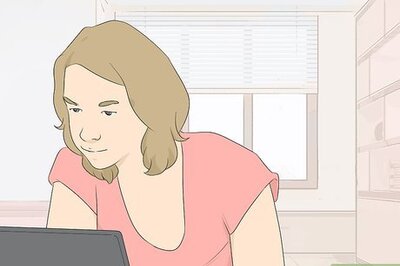
views
Getting and Staying Motivated
Make a game plan and stick to it. You can stay motivated by setting goals and keeping them throughout the course of your diet. If your goal is just to "lose weight," then you won't be nearly as motivated as you would be if you had a specific goal and a plan for how you would reach it. Here's what to do: First, figure out how much weight you want to lose, and how quickly you want to lose it. Make sure to set realistic goals. You can't lose 50 pounds in a month, but you can lose five pounds in a month if you stick to your plan. Your end-date could be a specific time like your wedding, your friend's beach barbecue, or the start of a new school year. Understand where you are now. What is your starting point? You can go visit a physical trainer for a fitness assessment or measure your waist, hips, and thighs so that you can compare your later progress to where you are now. Set a game plan for each week. How much weight do you want to lose per week? Pick one day to weigh yourself each week. Don't weigh yourself every single day or you will become obsessed with your weight. Set a workout routine for each week. Though you can't plan your workout schedule months in advance, at the beginning of every week, plug a few workout dates into your schedule. You can stick to your plan by keeping a log of what you ate, how much you worked out, and how much weight you've lost each week. The log can be helpful, but make sure it doesn't make you obsess over every single thing you eat. You can also keep a diary that charts your dieting thoughts and analyzes what worked and what didn't. This will help you get in touch with yourself.
Stay mentally strong. Whenever you begin to slip, you should remind yourself why you're dieting. Do want to get in shape for bikini season, or is your weight loss seriously affecting your health? Do you just want to lose those pesky 20 pounds you gained since college? Whatever your reason, keep telling yourself that you're determined to stick to your plan so you can reach your goal. Here are some ways to stay mentally strong when you feel like giving up: Keep an image in your head of what you are planning to change about yourself, like mental before and after photos. Some people have an old photograph of themselves from when they were their desired weight. Stick a photo or representation of this goal on the fridge to motivate you. If you ever think you can't be bothered to go to the gym, or want to splurge on a tub of ice cream, just remember your goal image. Keep motivational quotes on your computer or posted above your desk. This will help you remember to stay focused on your reasons for dieting. If you're trying to return to your former weight, you can keep a picture of that time period on your desk. Keep an index card that lists your reasons for dieting in your purse or wallet, so you can read it any time you forget why you're doing the diet in the first place.
Reward yourself for good behavior. It takes a lot of mental strength to stick to a diet, and you should remind yourself that you're doing a great job from time to time. If you reward yourself for good behavior, then you'll be more motivated to continue staying tough and losing weight. Here's how to do it: Reward yourself every five or ten pounds. Depending on how much weight you plan to lose, you should set up a rewards system every time you reach a new goal weight. You can get a massage or pedicure, buy a smaller pair of pants, or see a movie. If you've been really healthy during the week, reward yourself on the weekends. You can't eat really healthy every day of your life. Don't forget to tell yourself how amazing you are every time you lose a pound. Your rewards for losing weight don't always have to be food related. You can tell yourself that you'll buy a new pair of shoes if you keep up your diet for a month.
Don't diet alone. You'll be much more motivated if you have a diet buddy or other people to share your dieting woes with. This will make it easier for you to stay on track, because you will have someone there to encourage you. Here's how to make sure you don't diet alone: Find a diet buddy. If you are trying to improve your body at the same time as someone else you know, then you can share tips, work out together and motivate each other. Setting a gym schedule with that person, or planning weekly healthy meals with that person, can help you stay on the right path. Join a weight loss organization such as Weight Watchers. Whether you go to Weight Watchers meetings or just use the online resources, you will be motivated from knowing that there are thousands of people who are in the same boat as you. Discuss your plans with your doctor to make sure that any weight loss organization or support group you join is appropriate for you and your medical history. If you can't find a diet or workout buddy, find someone you can confide in, such as a friend or significant other. That person can help you stay focused and can listen to you if you're having a hard time following your diet.
Avoiding Temptation
Make sure you eat three meals a day. If you start to cut meals out, then you'll just feel tired, sluggish, and hungry, which will make you loose motivation. Choose foods like oatmeal for breakfast which keep you full for a long time, preventing unhealthy snacking before lunch. Eat dinner soon after getting home from work or school so that you don't pig out when you get in. Remember that breakfast really is the most important meal of the day. If you skip it, you will be much hungrier when you eat lunch and dinner and will eat more. Don't skip a meal just because you feel guilty for indulging the night before. This will actually get you more off track. If you have a busy schedule, try to plan when you'll have your three meals in advance. This will help you avoid tempting foods that you may come across during the time of a skipped meal.
Get rid of the unhealthy foods in your house. Though you shouldn't have to throw out all of the foods in your fridge and pantry, if you minimize the unhealthy foods in your home, you will be less likely to eat them. You can go through all of the unhealthy foods in your home and decide if you want to throw them out, make a family member eat them, or bring them to work and give them away. Some of the foods that you think are unhealthy are only unhealthy in excess. For example, if you eat a cup of peanut butter, you won't be helping your weight, but if you resolve to only eat a spoonful of peanut butter with celery at a time, you can keep the food. You can also get rid of the unhealthy foods in your house by making a shopping list that only contains the healthy foods you want to eat on it. When you go shopping, you can be determined to only buy the foods on the list so you don't come home with new unhealthy foods. Replace your unhealthy foods with healthy ones. Get rid of your ice cream and replace it with yogurt or fruit popsicles. You should still always keep some snacking options in your home.
Manage your eating when you're out. The trick is to not think, "Oh, I'm going out tonight, so I'm going to completely break my diet and pick it up again tomorrow." Though you will be faced with more temptations if you're out at a party or going to dinner with your friends, you don't have to completely give up on your diet for a night. Here's how to stay on track while you're out: Eat before you go out to a party. If you're going out to a party where you know you'll see a lot of delicious snacks, eat a solid meal before so you're less likely to get hungry and grab a snack. Make this meal a healthy, vegetable-based dish, such as a salad. The fiber will make you feel full so that you do not eat as much party food. Bring snacks with you wherever you go. If you're at a place that has few healthy options, like a movie theatre, bring a bag of almonds, grapes, or trail mix with you to avoid snacking on buttery popcorn. Choose the healthiest options of what you do see at dinner. If you're out for dinner, pick the healthier items on the menu, like grilled chicken, brown rice, or salad, instead of the most greasy or high-fat options. You can still be healthy while eating out. Choose healthy snacks over unhealthy ones. If you're at a party where there are a ton of snacks, snack on the foods in the veggie tray or pita chips instead of the plate of brownies or nachos.
Eat at home as much as you can. Eating at home is the easiest way to make sure to avoid temptation. If you're cooking at home, you can control everything that goes into your menu. When you're eating out, though you can choose healthier options, you won't have as much control over what you eat. Here's how to make the most of eating at home: Become a master chef. If you develop a love of cooking, you'll be more motivated to cook and will be excited to find new healthy recipes. Invite your friends to eat in instead of going out. Once you develop your cooking skills, if a friend asks you out to dinner, you can offer to stay in and cook instead. Not only will this be cheaper, but you'll be able to eat healthy in a more intimate atmosphere. Try to eat lunch at home or pack your lunch as much as you can. It's easy to splurge on fast food, especially if you're in the middle of a busy work day, but if you pack a simple sandwich or salad with you in the morning, you'll be less likely to want to eat something unhealthy.
Not Punishing Yourself
Love what you eat. There's no point starting a diet with the intention of eating foods you don't enjoy just because they'll make you skinny. Try out different recipes, and do little things to change your fat intake. Being on a diet doesn't mean that you should eat foods that you normally hate, but that you should discover new and healthier foods that can help you shed some pounds. Here's what to do: Go to your local farmer's market or the produce section of your grocery store. Make a goal of picking one new fruit and one new vegetable a week, and learning how to include it in a delicious recipe. Avoid the foods you hate. If you just can't stand the taste of tofu or just really hate brown rice, don't torture yourself by making yourself eat it. Find a way to put a healthy spin on your favorite meal. If you love spaghetti and meatballs, try a whole wheat pasta with veggie meatballs instead. Try adding extra vegetables to the sauce as well.
Find a workout that you love. Try a dance class, or different types of sports like tennis or swimming. If you find something you enjoy, then you're much more likely to do it often. If you like running, it could be a way to get some sun and enjoy a pretty view. Here's how to do it: Don't do anything that feels like torture. If you've always hated running, you don't have to do it. Try making a goal of walking for twenty minutes a day instead if you like doing that. Try new workouts that you've never done before. Take a dance, yoga, or pilates class and see if you've found a new passion. Mix it up. If you don't mind running but don't want to do it three times a week, you can run one day, do yoga another day, and swim on a third day. This will keep your body and mind active and won't make you feel bored through a workout. Don't overdo it. You don't have to exercise every day, or even five or six times a week, to get a great workout. Let your body rest if you're tired and you'll enjoy your "on days" even more.
Don't go hungry. You won't be able to stick to your diet if you find yourself so hungry that any food at all sounds appealing. If you're hungry, then you're much less likely to make rational decisions about what to eat next. Being hungry will also make you feel cranky, weak, and tired, and generally negative. Here's how to avoid being hungry: Make sure to have a meal or a light snack every few hours. Don't go five or six hours without food. Always keep healthy snacks with you wherever you go. If you know you'll be having a late lunch or dinner, factor a snack into your day or you'll be too hungry by the time the meal arrives. Don't starve yourself. Generally speaking, starving for women means eating less than 1,200 calories a day and for men, it means eating less than 1,500 calories a day. Not only will this just make you feel weak and lightheaded, but it is also dangerous and difficult to keep up on a long-term basis.
Indulge once in a while. In addition to rewarding yourself for a job well done every once in a while, you should just take little mini-breaks from your diet and indulge every once in a while so you don't feel so trapped in your new routine. As long as indulging doesn't send you on a downward eating spiral, it will only make you feel better every once in a while. If all of your friends are going out for a type of meal that you know won't be healthy, don't miss out just because you know it won't help your diet. If you really want to see your friends, just try to find a healthier option, or to enjoy the unhealthy food and just go to the gym later. Indulge your cravings once in a while. If you're really craving a chocolate chip cookie, it's much better to just eat one than to eat everything in your cabinet that isn't a chocolate chip cookie. Eat an "off meal" once in a while. Tell yourself that after every five or ten healthy meals, you'll get to eat whatever you want. This will keep you focused on staying healthy for the most part.
















Comments
0 comment